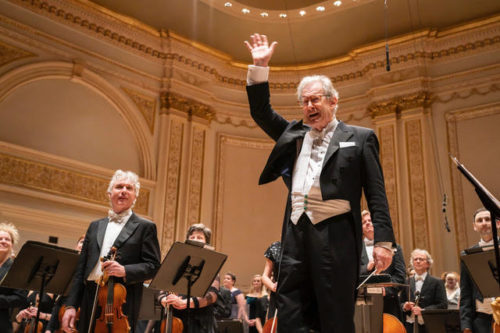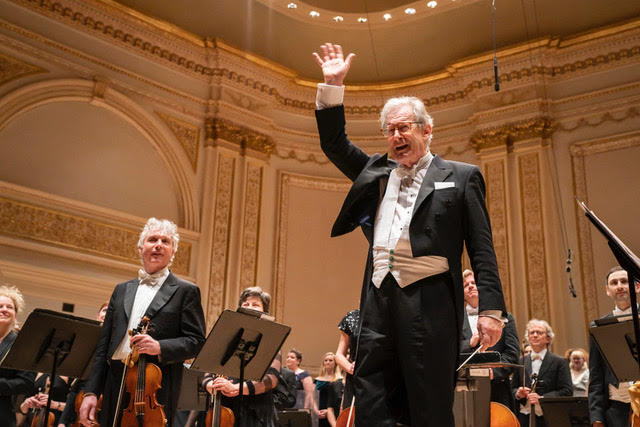 United States ORR Beethoven Cycle [3]: Lucy Crowe (soprano), Jess Dandy (contralto), Ed Lyon (tenor), Matthew Rose (bass), Monteverdi Choir, Orchestre Révolutionnaire et Romantique / Sir John Eliot Gardiner (conductor). Carnegie Hall, New York, 23 & 24.2.2020. (RP)
United States ORR Beethoven Cycle [3]: Lucy Crowe (soprano), Jess Dandy (contralto), Ed Lyon (tenor), Matthew Rose (bass), Monteverdi Choir, Orchestre Révolutionnaire et Romantique / Sir John Eliot Gardiner (conductor). Carnegie Hall, New York, 23 & 24.2.2020. (RP)

Beethoven – Symphony No.6 in F major Op.68 ‘Pastoral’, Symphony No.7 in A major Op.92, Symphony No.8 in F major Op.93, Symphony No.9 in D minor Op.125
Balmy, spring-like temperatures on a late February afternoon intensified the joy of listening to Beethoven’s two great symphonic paeans to nature performed by Sir John Eliot Gardiner and the Orchestre Révolutionnaire et Romantique at Carnegie Hall. ‘No one can love the country as much as I do’ wrote the composer, and Gardiner and the ORR made manifest not only Beethoven’s deep association with nature, but also the infectious cheerfulness that courses through the Sixth and the unbridled ecstasy of the Seventh, which Beethoven called ‘one of the happiest products of my poor talents’.
From the downbeat, Gardiner sent the Sixth Symphony coursing with a vigorous intensity that never abated. In the second movement, the kaleidoscopic flow of sound produced by a pair of muted cellos to the pizzicato accompaniment of the remaining ones and the contrabasses was so vivid that I half expected to see frolicking Rhine Maidens appear (the fish playing in the water were definitely not Schubert’s trout). It was almost as much fun to watch the woodwinds play as to listen to them imitating the sounds of birds. The country dances of the third movement were a wonderful romp, and when the furious storm abated in the finale, it was as if sunlight bathed the hall.
The Seventh Symphony is more a bacchanal than a celebration of country life; Wagner went so far as to call the finale a ‘Dionysian orgy’. With Gardiner, however, the audience would have to wait for the hedonistic thrills. He conducted the first movement with poise and restraint; the flutes provided an airy lightness and the horns added a rustic sensibility. The second moment’s relentless rhythms never faltered, but Gardiner gave it an expansive reading in which the gut strings and natural horns at times sounded much like human voices. With its violent slashes of sound, the finale was an outburst of ecstasy.
There was a noticeable change in the orchestra’s mood and demeanor as it walked on stage for the final concert. Gone was the bonhomie and in its place a more serious sense of purpose. Undoubtedly, conquering Beethoven’s Ninth Symphony had something to do with this change of mood, but it was more than that, as the sound they produced was also different. The quirkiness and idiosyncrasies that had enliven the prior concerts were less pronounced. What emerged instead was a symphonic sound of surprising depth and richness.
The compact, jovial Eighth Symphony has always posed a quandary for commentators as it is less radical than one might have expected from Beethoven at this stage in his career. It reveals the composer at the height of his powers and in a surprisingly ebullient mood. He was quick to reply to the observation that the Eighth was less popular than the Seventh with the retort, ‘That’s because it’s so much better’.
Gardiner built the first movement measure by measure and chord by chord, the intensity of which was released in a bloom of sound in the closing measures. In between came one of Beethoven’s loveliest melodies which, rather than conduct, Gardiner led with the swaying of his entire body. The more raucous sounds of the period instruments turned the second movement, famous for its rhythmic integrity and intensity, into a sturdy peasant dance. It might have minuet in its title, but the robust third movement, enlivened by the blare of trumpets, would have given a start to Haydn. The pulse that Gardiner had set in motion at the onset of the symphony was released in an explosion of sound in the blazing finale.
The Ninth is the symphony that I know best, having sung in the chorus for several performances of it. I don’t think that it was only a matter of my ear adjusting to the sonorities of the period instruments, but the sounds that the ORR produced were more varied and exciting than I had heretofore experienced. The emotional impact of their performance was correspondingly just as powerful. In short, Gardiner and the ORR were mighty impressive in their performance of Beethoven’s ultimate symphonic statement.
Bass Matthew Rose was a last-minute substitute for Tareq Nazmi, who was unable to appear due to visa issues. Rose overshot the mark in his blustery entry on ‘Oh Freunde, nicht diese Töne!’, but settled down to provide the foundation for the exceptionally fine quartet. Soprano Lucy Crowe emerged from the excruciatingly difficult climb to the climactic high B with both her musicianship and the beauty of her voice intact. That’s a rare feat, but Gardiner’s pacing and the transparency of the orchestral sound played their part in her success.
Jess Dandy’s commanding contralto made an impact. It’s rare enough to hear the alto line, let alone have it make you sit up and take notice. Tenor Ed Lyon joined the men of the chorus (literally) for a brisk rendition of the Turkish March that the piercing piccolo (which had provided so much excitement and entertainment throughout the many hours of music) made even more lively.
As had the quartet, the Monteverdi Choir sang from memory, which made for unhindered contact with Gardiner and freed them to communicate directly with the audience. This is Gardiner’s handpicked chorus which he has nurtured for decades: excellence is their byword.
Beethoven’s Ninth Symphony was the apex of all that had come before in this remarkable and enlightening series of concerts. It was an honor to observe and listen to these musicians perform some of the greatest music ever composed. I was moved, inspired, entertained and dazzled by the sounds I heard. These performances challenged old notions and changed how I will perceive Beethoven, the man and his music, going forward. And as with the Fifth Symphony, the final notes that sounded in Carnegie Hall at this final concert by Gardiner and the ORR resounded with triumph and optimism.
Rick Perdian
